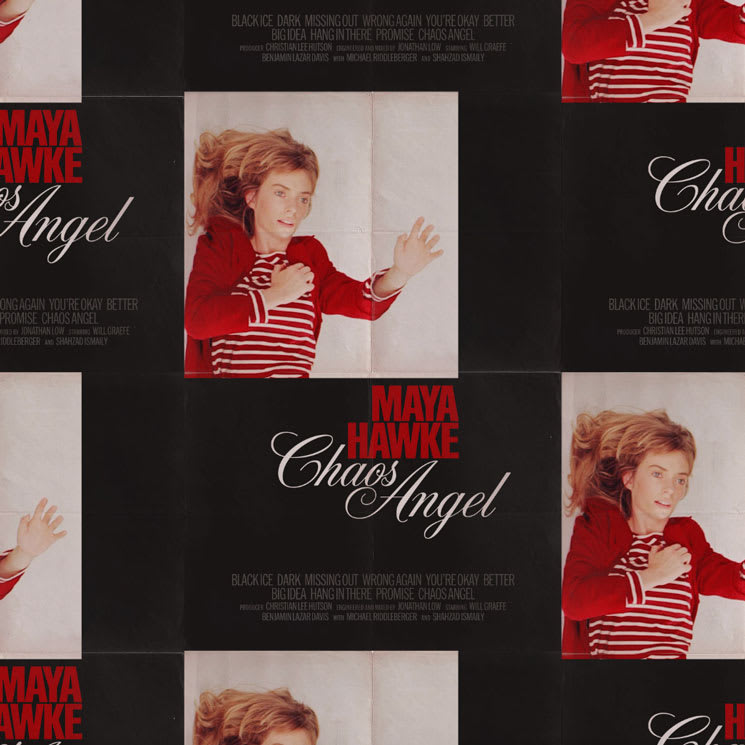Maya Hawke's two albums, Blush and MOSS, were perfectly amenable collections of folk-pop confessionals, all united by her breathy tone and evocative free-poetics. There's a slightly ingratiating effect in her genuine affection for sound, with Blush in particular bristling with the joy of experiment; she's a true lady of the canyon, indeed. If culture feels it pertinent to examine intentions (I don't), rest assured that both vanity and venality are absent from her work.
She's convinced us of her devotion to balladry and its sedative pleasures, and on new record Chaos Angel, she doesn't fuck with the formula, so to speak. A further expansion of the clean stream of consciousness that is her discography, Chaos Angel proves, at its worst, that Maya has found her groove and ain't nothing's going to break her autumnal stride.
Opening ceremony "Black Ice" brings together a grand choir of cherished collaborators, including Stranger Things co-star Sadie Sink, for a warm, wintery ballad of familiar aura. The sing-song cadence and sway of the outro ("Give up, be loved / Give up, be loved") is ecclesiastic in its purity. Subsequently, "Dark" aligns itself so neatly with prior work as to almost be invisible. Mid-spell, the arrangement emancipates itself and flourishes, teasing extant potential only glimpsed.
"Okay" has the pageantry you come to expect from an artist coming into her own with considerable resource, driven by booming bass drum and forming signals of genuine romance from its smoky vocals. Plus, a guitar solo! A production team after my own heart. The incantatory lyrics ("If you're okay, then I'm okay / If you're okay, then I'm okay") is effective in its hypnosis on arguably the best track. But it faces stiff competition with "Missing Out," which evinces hyper-awareness of Hawke's reputation and annoyance with East Coast collegiate camaraderie. Rapping in the classical sense about the plight of the privileged with alt-pop flair, it's good enough to earn forgiveness for its gross misrepresentation of Chaos Angel's sound as lead single.
It doesn't really matter that the tenor of her voice is so palatable, especially if you subscribe to the truism that talent is manufactured rather than discovered. Producer Christian Lee Hutson is on the hook here after taking an album off. As proverbial midwife of Hawke's third brainchild, the frustrating restraint of the record can safely be hoisted upon the guy continually pushing her voice to the absolute forefront. This wouldn't be as major of a malfunction if the diffidence of the arrangements and mixing didn't make the lyrics the main course here. There's an exemplary exposition of Hawke's aptitude in "Big Idea," a self-reflexive series of one-line poetic waxing, like those extra Rimbaud-ian Bob Dylan tracks on his '60s albums. Oblique and diaristic, it ventures into realms both charmingly impudent ("I believe in a God nobody should trust") and plain bad ("All intelligence is artificial / We're just making love on a malistic missile"). And he-said-she-said lyricism stymies its own romance with excessive enigma. There's some spritely synths and a talented steel guitarist that peeks out infrequently, but the bed in which Maya Hawke yawns and stretches and twirls her hair is a mattress on the floor.
The vicissitudes of the business and imposter syndrome may have rendered Hawke's vision slightly parochial. A lot of the diversity has melted in favour of grand swings and sugar-sweet melodic hooks you can put over longer short-form videos (GRWM, fall edition!). "Better" is a pointless interlude that shows affection for Obama-era Kanye West, while "Hang in There" serves solely to extend runtime, the shortest of her career so far. Hawke's hook machine has exhausted itself by "Promise," highlighting the resistance to symbiosis between vocals and instrumentation beyond obligatory bridges. There is definitely a figurative beating heart beyond the omnipresent thump of the bass drum; this is no worse than anything prior. But the struggle for identity espoused on "Missing Out" loses credibility when you're afraid of your own dimensions.
